
Dramatic Increases in Fatal Drugged Driving Crashes, Workplace Accidents, Arrest Rates, Black Market Activity in States That Have Legalized Marijuana
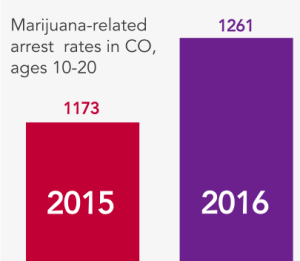
Not only are more young people being arrested for marijuana use in states that have legalized the substance, but Colorado has also seen an increase in the amount of youth on probation who have tested positive for the drug.
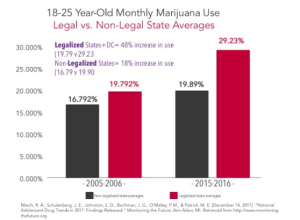
This rise in youth use of marijuana is particularly frightening to see given the longterm implications involved with young people becoming addicted to marijuana. “Since commercialization, those of us in addiction treatment have been seeing an increase in the number of patients who have become addicted to marijuana. Their symptoms, particularly sleep disturbance, appetite disturbance and psychosis, don’t consistently remit after ninety days of treatment,“ said Bari Platter, Clinical Nurse Specialist at the University of Colorado Hospital’s CeDAR (Center for Dependency, Addiction and Rehabilitation). ”We need to do more research about the devastating long-term effects of marijuana before considering commercialization in other states, continued Platter.“
Some supporters of legalization have argued that the relaxing of marijuana laws would lead to lower rates of alcohol consumption. The data prove otherwise. In the immediate year following legalization of marijuana, there was a clear drop off, but by year three alcohol consumption was at a multi-year high.
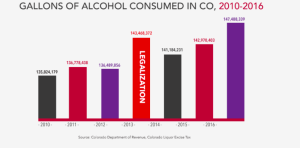
Commercialization advocates have long argued that legalization will reduce black market marijuana activity in legalized states. However, criminal activity has only been amplified. In 2016 alone, Colorado law enforcement confiscated 7,116 pounds of marijuana, carried out 252 felony arrests, and made 346 highway interdictions of marijuana headed to 36 different U.S. states. The U.S. mail system has also been affected by the black market, seeing an 844% increase in postal marijuana seizures. Narcotics officers in Colorado have been busy responding to the 50% increase in illegal growing operations across rural areas in the state.
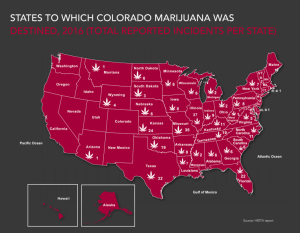
“It’s very concerning that this data is not what we’re hearing in the news, but is instead spin jobs, incomplete information, and biased information promoted and pushed by Big Marijuana,“ said Dr. Aaron Weiner, PhD, Director of Addictions at Linden Oaks Behavioral Health. “It’s impossible to read this brief and not want push back to keep our kids and young adults safe from this predatory industry,“ Wiener continued.
One of the most common arguments prevalent amongst the pro-marijuana lobby is that the legalization of the substance will greatly assist communities of color. The study found that the common disparities among use and criminal offense rates continue among race, ethnicity, and income levels. The District of Columbia saw public consumption and distribution arrests nearly triple and a disproportionate number of those marijuana-related arrests occur among African-Americans.
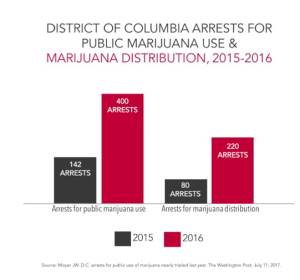 Finally, the study found a disturbing trend in that drugged driving and motor vehicle fatalities have increased in states that have legalized recreational marijuana. The number of drivers in Colorado intoxicated with marijuana and involved in fatal traffic crashes increased 88% from 2013-2015 and marijuana-related traffic deaths increased 66% between the four-year averages before and after legalization.
Finally, the study found a disturbing trend in that drugged driving and motor vehicle fatalities have increased in states that have legalized recreational marijuana. The number of drivers in Colorado intoxicated with marijuana and involved in fatal traffic crashes increased 88% from 2013-2015 and marijuana-related traffic deaths increased 66% between the four-year averages before and after legalization.
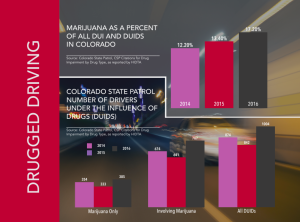
The gradual normalization of marijuana commercialization in Colorado and other states means people become accustomed to the rise in THC-impaired driving fatalities or to witnessing psychosis induced by marijuana,“ said Dr. Christine Miller, PhD, former instructor and research associate at Johns Hopkins School of Medicine.
”The marijuana industry is actively working to become the next Big Tobacco. The use of THC candies and drinks are catering to young people and getting them into the drug at an early age,“ said SAM President Kevin Sabet, PhD. “At a time when our nation is struggling with a crippling opioid epidemic, the last thing we need is young people getting caught up in drug use thanks to a relaxing of drug laws. This study should serve as an eye-opener for our policy makers at both the state and federal level,“ continued Sabet.
####